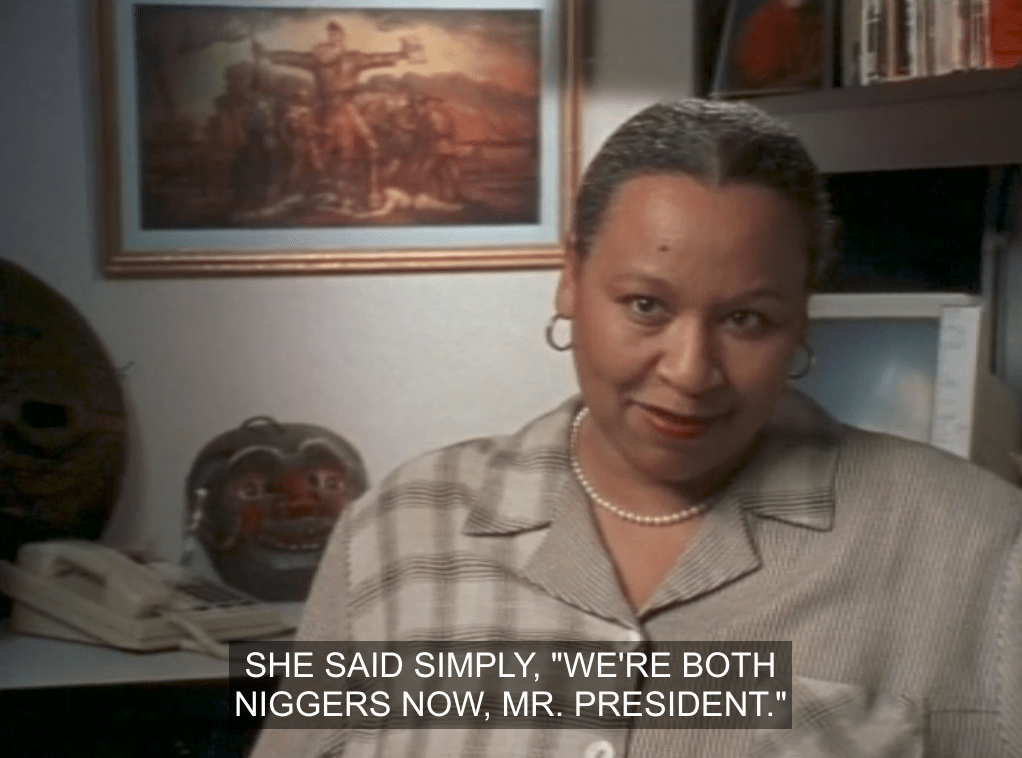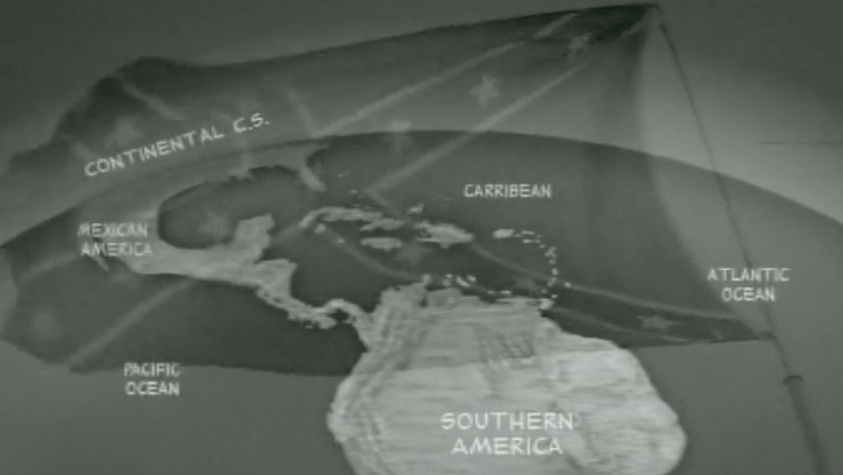In CSA: The Confederate States of America, the American empire that emerges after the South wins the Civil War builds the Cotton Curtain, a wall meant to keep a bordering nation out of the CSA’s affairs. The twist here is that the wall is on the Canadian border, because the neighbouring country wants the CSA to end slavery.
Image: IFC FIlms
The most chilling thing about CSA: The Confederate States of America is how close it can feel to the world of today. Written and directed by Kevin Willmott, the 2004 film flew under my radar until recently, when I learned about it during a conversation about HBO’s in-development series Confederate.
Presented in satirical mockumentary form, the movie’s introduced as a banned piece of British-made TV journalism from the United Kingdom in a world where the South defeated the North in the American Civil War.
In the film’s first third, the American sociopolitical timeline largely happens as it actually did. The break from real-world history happens when Britain and France lend their support to the Confederacy. In the movie’s alt-universe, the European nations were swayed by the splinter states’ argument that their battle was for self-determination, not slavery. With British and French troops fighting alongside the South’s soldiers, the Battle of Gettysburg turned into a defeat for the Union. The White House gets taken by enemy forces and Lincoln goes into hiding, seeking help from Harriet Tubman.
Tubman plans an escape for the last president of the United States that requires the use of the Underground Railroad and blackface. Lincoln balks at the complexion change, but a historian in the film relays Tubman’s retort:

Changes to history start rippling all throughout the CSA timeline: Lincoln dies as a disgraced exile in Canada, “Dixie” becomes the National Anthem and, instead of making Birth of a Nation, D.W. Griffith makes Dishonest Abe, a movie about Lincoln’s capture. With black people legally treated as property, the alt-history of the CSA sees the near-total eradication of Plains Indians people — with no mention of reservations — and a Yellow Peril Mandate that also renders Chinese immigrants into property.
Laws that made the CSA into a Christian nation also made Jewish people persona non grata, with a small contingent allowed to live on reservations on Long Island. Culturally, the collective memory of history gets rewritten so that the War of Northern Aggression didn’t happen because of slavery, erasing and normalizing centuries of black pain and suffering from the public consciousness.
The film shows a recognisable idea in the form of a family that becomes a Democratic political dynasty. But the generations of Fauntroys don’t earn money and power from running moonshine and going legit; their rise happens by creating the legislation that becomes the Davis Plan, a law that makes slavery the law of the land. The Davis Plan called for heavy taxes on former Unionists to rebuild broken cities, but those payments could be voided if the defeated citizen bought slaves for work or industry.
As time goes on, Mexico gets invaded, annexed, and ruled under an all-too-familiar system of “apartness.” From there, the CSA conquers South America.
The country’s adherence to being a slave-ocracy results in pariah status, global sanctions, and a deeper isolationism. This version of America welcomed Hitler warmly as its ideological kindred and stayed neutral in World War II. The CSA demands the return of black people living in Canada and almost goes to battle over it, creating a different kind of Cold War. Rock ‘n’ roll gets born in Canada, James Baldwin’s fierce writing also emerges across the Northern border, and that country becomes a sports and cultural superpower because black people could live free there.

Thirteen years ago, the fractured-mirror distortions presumably garnered loads of chuckles from viewers. A lot of the dark humour in CSA is broad, coming out in the form of commercials for trade schools specializing in negro corralling and medical studies, electronic GPS shackles, and mammy sitcom Leave It to Beulah. But there’s a painful pointedness to all the japery, too, and I found myself cringing more than I was smiling.
The same kind of nation-first and states’-rights framing that won British and French aid for the Confederacy in CSA is being used here in the real world as cover and justification for legislation that threatens to leave marginalized peoples living in the United States even more vulnerable. We have a President who issues half-hearted condemnation of white supremacists. In 2017, it’s hard to laugh at CSA and easier to shiver at it.
One element of note is how CSA manages to feel like a fever dream. The dark absurdist comedy and TV news-magazine production values add a layer of cognitive distance while still creating an atmosphere of racial dread. We know that institutional and individual violence against marginalized people is happening in the history of this fiction, but we don’t have to see it. Shifting the focus from pain to large-scale consequence feels like a canny and welcome decision.
CSA: The Confederate States of America is a work of speculative fiction that imagines what our country would look like if white, Christian, straight men were never forced to give up their total monopolization of true political power and recognise the humanity of people unlike them. More than a decade later, when freedoms won long ago feel dangerously close to being diminished or revoked outright, the film feels less like a jokey thought experiment and more like a cautionary tale.
